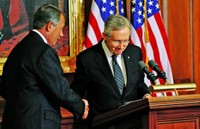Advertisement
Grab your lab coat. Let's get started
Welcome!
Welcome!
Create an account below to get 6 C&EN articles per month, receive newsletters and more - all free.
It seems this is your first time logging in online. Please enter the following information to continue.
As an ACS member you automatically get access to this site. All we need is few more details to create your reading experience.
Not you? Sign in with a different account.
Not you? Sign in with a different account.
ERROR 1
ERROR 1
ERROR 2
ERROR 2
ERROR 2
ERROR 2
ERROR 2
Password and Confirm password must match.
If you have an ACS member number, please enter it here so we can link this account to your membership. (optional)
ERROR 2
ACS values your privacy. By submitting your information, you are gaining access to C&EN and subscribing to our weekly newsletter. We use the information you provide to make your reading experience better, and we will never sell your data to third party members.
Policy
Government Stalls
Congress: Partisan struggle to set the fiscal 2011 federal budget moves agencies toward closing
by Susan R. Morrissey
April 11, 2011
| A version of this story appeared in
Volume 89, Issue 15

With only hours left before the latest measure to fund the government for the rest of the fiscal year was set to expire last week, leaders in both houses of Congress remained unable to find common ground on budget cuts and an array of policy proscriptions. Without a deal, government agencies moved toward a shutdown at midnight on April 9.
At C&EN’s deadline, House of Representatives Speaker John A. Boehner (R-Ohio) and Senate Majority Leader Harry M. Reid (D-Nev.), with the help of the White House, continued to work on a deal that both Republicans and Democrats could support. The sticking points reportedly involved just how much money to cut from the so-called discretionary or nondefense portion of the federal budget and whether amendments for an array of Republican policy positions would be attached to the final spending bill.
“I remain confident that if we’re serious about getting something done, we should be able to complete a deal and get it passed and avert a shutdown,” President Barack Obama said at a brief April 6 news conference that followed a late-night meeting with House and Senate leaders. Boehner and Reid called the talk “productive,” although no agreements had been reached.
Talks were expected to continue nonstop in an attempt to avoid a shutdown. It was hoped that another stopgap funding measure could win support at the eleventh hour, but Obama said he would sign off on such a short-term deal only if significant progress was being made toward a final measure for fiscal 2011.
As the congressional debate played out, federal agencies were making plans to deal with a possible shutdown. Most agencies were keeping those plans confidential.
But at the Department of Energy, April 11 will be a normal working day regardless of a government shutdown. In a memo obtained by C&EN, DOE Secretary Steven Chu states that because the department has “no-year appropriations”—that is, money that is not budgeted for a given year—DOE would continue to operate, at least for a while.



Join the conversation
Contact the reporter
Submit a Letter to the Editor for publication
Engage with us on Twitter